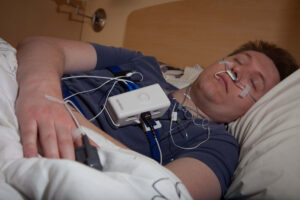
A sleep study can be performed in a sleep centre or a hospital’s sleep disorders department. Normally, the test is conducted at night. Sleeping during the day may be an option for shift workers who usually sleep during the day. If you have been given a diagnosis of a sleep disorder, a sleep study may also aid in formulating a treatment plan. Using it might also allow you to modify your treatment plan. You might occasionally be able to complete the sleep study at home. Obstructive sleep apnea is diagnosed with the aid of at-home sleep apnea tests.
Why is Polysomnography done?
The phases and cycles of your sleep are tracked by polysomnography. It can determine if, when, and why your sleep habits are disturbed.
NREM sleep, or slow-wave sleep, is the initial phase of regular sleep. This is when the brain waves begin to slow. This is captured by an electroencephalogram (EEG) test performed during a sleep study.
NREM sleep lasts for one to two hours before brain activity resumes. Rapid eye movement (REM) sleep is the name of this stage of sleep. During REM sleep, your eyes quickly flicker back and forth. The majority of dreams happen during this sleep phase.
Every night, you normally go through several sleep cycles. Approximately 90 minutes pass between NREM and REM sleep cycles. However, sleep problems might obstruct this sleep cycle.
What takes place throughout a polysomnography?
Usually, a polysomnography is performed at a large hospital or specialised sleep centre. About two hours before your customary bedtime, in the evening, your appointment will start.
At the sleep centre, where you’ll stay in a separate room, you’ll spend the night. Bring your own pyjamas and anything else you need for your bedtime ritual.
The polysomnography will be administered by a technician who will watch over you while you snooze. The technician has audio and visual access to your room. Throughout the night, you will be able to communicate with and hear the technician.
The following are some benefits of doing a sleep study exam in Delhi:
Correct Diagnosis: A sleep study exam enables medical personnel to track and assess different physiological factors while a patient is sleeping, including heart rate, oxygen levels, brain waves, and breathing patterns. This thorough evaluation assists in correctly diagnosing sleep problems such as sleep apnea, insomnia, narcolepsy, and restless legs syndrome.
Individualised Care: Healthcare professionals can create treatment regimens that are customised for each patient’s needs and specific sleep condition with an accurate diagnosis from a Delhi sleep study test. With a more individualised approach, therapies are more successful, resulting in greater sleep and general wellbeing.
Finding Underlying Medical Conditions: Sleep disturbances can serve as symptoms of underlying illnesses. These illnesses, such as cardiovascular troubles, neurological abnormalities, or respiratory problems, can be detected with the aid of a sleep study test in Delhi. For the management of one’s general health, it is essential to identify and treat these underlying medical disorders.
Enhanced Quality of Life: Sleep issues can negatively affect mood, productivity, everyday functioning, and general quality of life. People can have better sleep habits, less daytime sleepiness, more alertness, and improved cognitive function by having a sleep study exam, followed by the proper treatment.
Complication avoidance: Untreated sleep disturbances in some people can have detrimental effects on their health. For instance, untreated sleep apnea can raise your risk of diabetes, hypertension, heart disease, and stroke. People can avoid or control these potential consequences by getting a sleep study and appropriate intervention.
Many skilled and knowledgeable pulmonologists, neurologists, and other medical specialists may be found in Delhi. You can take advantage of their experience by having a polysomnography test in Delhi, as they can offer thorough evaluations, precise diagnoses, and useful treatment recommendations.
Conclusion
Although polysomnography includes fewer sensors, it can be done at home. A sleep study does not, however, need uninterrupted sleep. Obstructive sleep apnea is typically diagnosed with a home sleep study. The sensors are taken out in the morning if the sleep study is performed at a sleep centre. The person can carry on with their regular morning routines. It takes three weeks for sleep research data to be released. An increase in blood pressure, depression, stroke, and heart problems can result from untreated sleeping difficulties. However, these examinations assist in identifying the problem so that the right course of therapy can be initiated to enhance the patient’s quality of life.